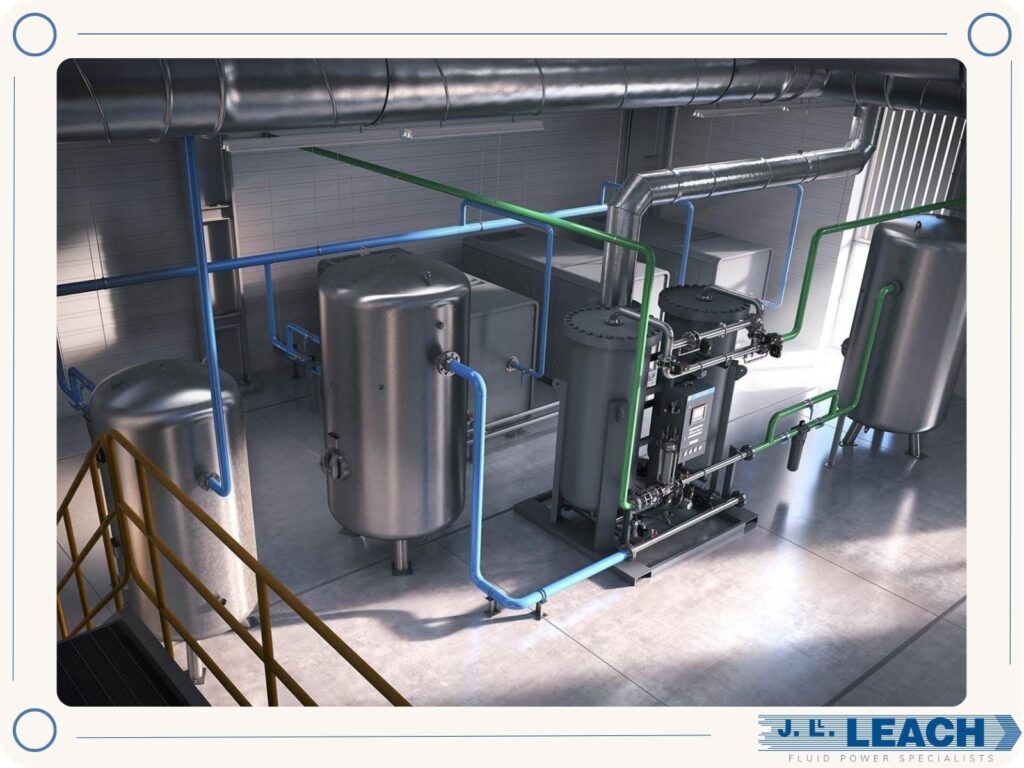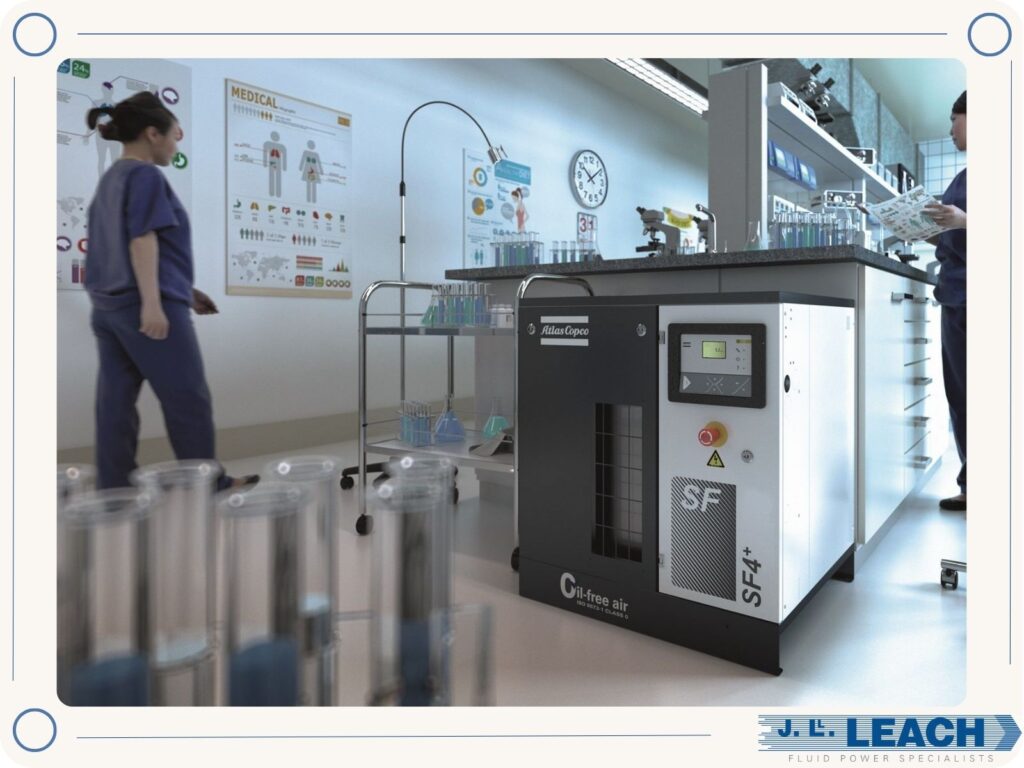Air compressors are everywhere, and while it might seem an exaggeration to say it’s easier to list what they aren’t used for, it’s not that much of an exaggeration. You will find air compressors in almost every economic sector, and often in places where you least expect them.
Part of the reason is there isn’t really a single type of air compressor, while they all perform the same basic function, compressing atmospheric air into a smaller volume to transmit power for other uses, they come in a range of sizes and types. That range has made them indispensable for almost every industry you can imagine.
Table of Contents
Understanding compressed air
Perhaps the primary use for air compressors is for transmitting power (although, as we’ll see, that isn’t the only reason compressed air is useful). This relies on the fact that energy is conserved. Essentially, a compressor transforms energy (usually electricity) by compressing air, to retain it as potential energy. This means that it can be easily delivered, and even stored, for use in compressed air tools and downstream equipment.
There are two main methods of compressing air: The first is positive displacement. This is the most obvious method, since it’s basically squeezing air into a smaller space. Anyone with even passing familiarity with an engine will immediately understand the way a piston air compressor works, but other types of positive displacement compressors include rotary screw compressor and scroll compressor. In every case, they work by capturing air and then reducing the volume of that air to store kinetic energy.

The second method is dynamic displacement. The end result is the same, but the input energy is transformed into potential energy within the compressed air. However, with dynamic compressors, the energy is first transformed into kinetic energy. For example, centrifugal compressors drawl air in towards an impeller, increasing the velocity of the air, and generate high pressures by restriction. They are ideal for applications that require continuous compressed air at high pressures.
The uses of air compressors
Creating an exhaustive list of compressed air applications would be impossible. No matter how hard you try, there will inevitably be someone, somewhere, using it in a way you could never have imagined. However, as a start, here are some of the popular, as well as some less familiar uses.
Manufacturing
The use of compressed air in manufacturing is so varied that it probably demands a list of its own. One of the key functions of compressed air is providing power. Examples include motion systems, like conveyor belts, and tooling, where pneumatic tools can often provide more power than the electrical equivalents.
Compressed air is frequently used in manufacturing processes, from simply clearing areas during assembly stages, to generating nitrogen gas to create a pure atmosphere for welds.
Construction
Once again, compressed air comes into its own in providing site power. A portable compressor can power heavy-duty tools like pneumatic hammers and drills, that a portable generator simply could not support. Whether it’s on a roadside or a construction site, compressed air makes work possible, even when mains power is limited.
Agriculture
Again, compressed air comes into its own when it comes to powering agricultural site equipment, where consistent power supplies can be remote, if present at all.
Also often used for specific agricultural tasks, such as crop spraying, where it can be used for a consistent distribution of pest control or fertiliser sprays and to provide ventilation in greenhouses, to maintain optimal growing conditions.
Automotive industry
Like manufacturing, compressed air is frequently used to power equipment in automotive vehicle assembly. There are also some more specific uses, such as paint spraying and body treatment.
Air compressors are also found in car garages, where they are used in maintenance and repair and, of course, pressurised air is used to inflate tyres.
Healthcare
Air compressors are commonplace in healthcare settings. Probably one of the least popular uses will be in a dental surgery, where small compressors can be used to power dental tools. However, air compressors can also provide life-saving services, offering not just ventilation, but also air purification in settings where high air quality is vital for life support.
Food and beverage manufacture
Compressed air is essential in food and beverage manufacture. In fact, much of the food in your cupboard is only there because compressed air has made it possible. With filters, clean air from a compressor can be used in food preparation, from delicate tasks like shelling shellfish and eggs, to cutting fruit and vegetables with air pressure ‘blades’.
High-purity air is used not just to keep food manufacturing areas clean, but also to generate nitrogen. This can be used to gas-flush packaging, keeping food fresh, preventing the growth of bacteria, and ensuring it’s safe to eat when it gets to your plate.
HVAC systems
Perhaps unsurprisingly, compressed air is used in heating, ventilation, and air conditioning systems. Sometimes, this is even as a by-product; the heat created by the air compression process can be reclaimed, to provide local heating, for example. Compressed air is also essential to refrigeration mechanisms; most people don’t realise that they already have their own compressor within the cooling circuit of their fridge at home.
Specialised uses
There are also some specialist uses. If you need them, or have ever needed them, you will already know about them, but if not, you may be surprised by some of them:
Transportation
Compressed air is one of the hidden components of a lot of transport. Air brakes are common in trains and public service vehicles. Although you might sometimes think you get a bumpy ride, air suspension is common in public transport and, whenever you see automatic doors, they are often actuated by compressed air.
Theme parks
Compressed air is frequently a key part of theme park rides, helping to power the ride that terrifies you, but also keeping you safe, via the braking system. If the more sedate rides are more your cup of tea, the chances are that any animatronics have compressed air moving those parts for your amusement.
Scuba diving
Finally, there are lots of uses to which compressed air can be put but, sometimes you don’t want the power or versatility of compressed air, you just want to make air smaller.
If you have ever been diving, you’ll know that it’s not oxygen in the tank, but compressed air, and that means that every dive shop will have a well-filtered, high-pressure compressor that can keep their tanks topped up.

Choosing the right type of air compressor for your needs
Whatever your industry, you probably need, or benefit from compressed air. However, what type of air compressor is best will depend on how you are planning to use your compressed air.
One important consideration is what you are going to use your compressed air for. Although this post has listed industries when illustrating how compressed air is used, it’s essential to think about your use, rather than your industry, when choosing a compressor. Two companies in the same sector can use compressed air in entirely different ways, and it’s the role which should determine the compressor you select.
Useful factors to consider, are whether the compressor needs to offer a consistent supply of compressed air, or just occasionally power tools? Do you have any specific requirements for purity, for example, if using the compressed air directly in food or pharmaceutical manufacture processes? Do you need your compressor to provide high-power compressed air that can support a large facility, or do you just need a little compressed air for small tools?
Plus what about the future? You might know what your system needs to power today, but what about tomorrow? You might be expanding your operation or be in a business where you can have sudden rises in demand and will need a compressor that accomodate that.
Whatever your needs, it’s always important to obtain expert advice.
Whether you need compressed air for multiple purposes on a large industrial site, or a small unit for commercial use (or even home use in a personal workshop), take advantage of the experts.
J Ll Leach has been supplying, installing, and servicing air compressors for almost every use imaginable for over 80 years. Our team of engineers have gained a wealth of experience across a range of sectors, and you can benefit from that. If you are just starting to think about how you might use compressed air, or you have a good idea, but you’re not sure where to start, our experts can offer you the advice and guidance to make sure you come to the right decision.












